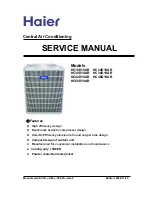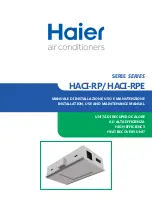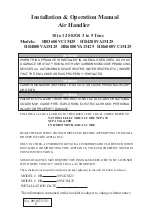
20
Checking the Dampers
Check the dampers for cleanliness.
Check the damper blades for rotation.
Check proper damper closing
Checking the Filters
Check the filters for condition and fouling (fouled filter inserts
must be replaced).
The filter inserts must be exposed in an environmentally-friendly
way.
Check the settings of the differential pressure sensors.
Maximum values of the pressure drop for each filter type
(according to EN13053:2006 E):
G3–G4
150 Pa
M5 (F5), M6 (F6), F7
200 Pa
F8–F9
300 Pa
Filter Replacement
Different types of filter mounting are used depending on the air-handling unit
size, filter type and filtration class. When replacing filter inserts, always check
the condition of the sealing; if damaged, replace the sealing with a new one.
If checking or replacing the filters, follow these procedures:
Figure 27 –
Filter insert removal
Figure 26
– Bearing lubricating intervals
a
Ball radial bearings
service hours
ot./min
Bearing type
Lubricant type
Y
Lithium lubricant based on
mineral oil - consistency NLGI 3
SNL-SYT
Lithium lubricant based on
mineral oil - consistency NLGI 2
Maintenance and lubricating of ADH-RDH double
-inlet fans equipped with a spiral fan casing and belt
drive
All maintenance operations and lubrication must be performed using
suitable tools and implements. First check the bearings by listening to
them. If the bearings are in good condition they will generate a slight
and constant noise while defective bearings will generate a loud and
irregular noise.
Low metallic noise, which is caused by the standard allowances
between components, especially at low speed, is normal. Excessive
vibrations and increased temperature of bearings indicate a possible
defect.
It is also necessary to check the mounting of the fan bearings
in their casings for intactness and also for excessive lubricant
leakage. Moderate leakage of lubricant, especially during the fan
commissioning, is normal and has no negative influence on the fan
operation.
Estimated mechanical service life of bearings installed in the ADH/
RDH Nicotra fans is 40000 hours providing the fans were selected
considering their operating limits, the environment and planned drive
size.
The service life of the bearing lubricant can be shorter than the service
life of the bearings.
Bearings mounted in rubber silentblocks or in casings without
lubricating nipples are not intended to be additionally lubricated.
Bearings equipped with lubricating nipples are used with fans
intended for heavier duty operation and working conditions. Regular
lubricating is essential to achieve the maximum service life of
bearings.
Only bearings of ADH/RDH „K“ and „K1“ fans (intended for higher
performance) need to be lubricated.
Marking of fan assemblies: XPVA and XPVR with „K“ and „J“ in the
tenth place of their code
Lubricating Bearings
There are many factors influencing the lubricating interval of fan
bearings: bearing type and size, working speed, ambient temperature,
diameters of pulleys, installed input, type of lubricant and working
environment. Therefore, information based only on statistics can be
provided.
Resulting from the above-mentioned reasons, the lubricating interval
of bearings tf (i.e. the period for which the bearings are lubricated at
99% certainty, and which represents the time L1 - service life of the
lubricant, e.g. L10 - the service life of the lubricant equals 2.7 x L1) can
be obtained from the chart below considering the speed and pulley
diameter. This chart is valid for bearings mounted on horizontal shafts
and for normal loading at temperatures up to 70°C.
Never schedule the lubricating interval longer than 30000 hours.
The amount of lubricant for standard applications (the temperature will not
exceed 70°C) can be calculated from the relation below:
Calculation of the grease amount:
(g/h) = 0.005 x D x B
g = grease amount (g)
h = service hours
D = outside diameter of the bearing (mm)
B = total width of the bearing (mm)
To re-lubricate the bearing, it is necessary to use the same type of lubricant
as that used for the original lubrication
Operating Checks and Service Regulations
















































